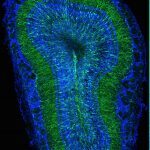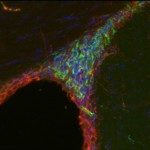Lien vers Pubmed [PMID] – 27640898
Brain Behav Immun. 2017 Feb;60:38-43.
The olfactory bulb (OB) is a highly plastic structure that can change organizational networks depending on environmental inputs in adult mammals. Particularly, in rodents, adult neurogenesis underlies plastic changes in the OB circuitry by continuously adding new interneurons to the network. We addressed the question of whether microglia, the immune cells of the brain, were involved in pruning OB neurons. Using lentiviral labeling of neurons in neonatal or adult mice and confocal analysis, we showed that microglia engulfed parts of neonatal-born and adult-born neurons in the healthy OB. We demonstrated that OB deafferentation by Dichlobenil administration induced sensory deprivation. It also increased phagocytosis of adultborn, but not neonatalborn neurons, by activated microglia. Conversely, intranasal lipopolysaccharide administration induced activation of microglia but changed neither adult neurogenesis nor olfaction. Our data reveal that steady-state microglia eliminate adult-born neurons and their synapses in both healthy and sensory deprived OBs, thereby adapting neuronal connections to the sensory experience.
KEYWORDS:
Adult neurogenesis; Hyposmia; LPS; Neuroinflammation; Spines







